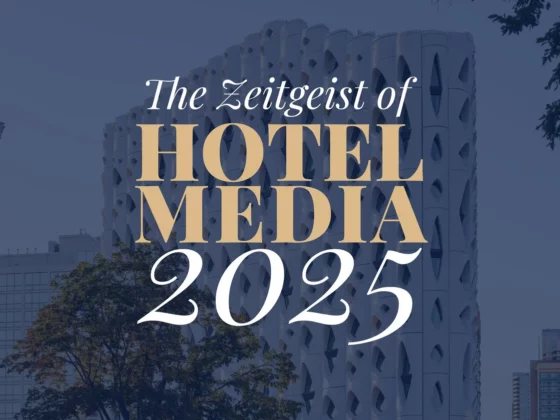With the implementation of artificial intelligence becoming more widespread across industries, it’s important for companies to understand the technology’s role and capabilities. This is especially true for those of us in the hospitality industry, which has always been defined by how we interact with our guests and provide them with exceptional service and memorable experiences.
Most early adopters of AI will agree that the most immediate and beneficial impact of its implementation has to do with enhancing productivity. Though it may not sound as glamorous as generative AI or robotics, which do play a role, it is a critical role at a critical moment for the industry as owners, managers and brands are challenged with historic wage growth and heightened levels of inflation. These challenges have put considerable pressure on operating margins, which is why improvements in productivity are a boon for the industry and why has the potential to be a salve, of sorts.
However, there is concern around both the operational and ethical implications of AI, leading to questions about how it will affect the workforce, change the way we interact with our guests and address the way personal data is collected and utilized.
Key Benefits
Remington Hospitality has implemented and used AI to enhance productivity, expand data sources and optimize tools, including proprietary business intelligence and analytics platforms. Reasons for this are many, but chief among them is an immediate benefit to all stakeholders, internally (corporate and property teams) and externally (ownership partners), by having a direct impact on the bottom line.
Like many other companies, time and money are reasons to lean into AI—our process started six years ago upon realizing the amount of time manually collecting, analyzing and reporting data via Excel and PDFs. This led to a complete overhaul and and approach to analytics, which began with building both a comprehensive data strategy and a strong data foundation, both of which are critical first steps for organizations looking to implement business intelligence and artificial intelligence tools.
A pivot to AI and more modernized technology not only saves money by reducing hundreds of man-hours by eliminating most manual data and reporting tasks, it results in a massive competitive advantage given that it both analyzes more data and provides more insights than any other tool in the industry.
Knowledge is power and also unlocks greater efficiencies. While data has been historically difficult to collect and manage in the hospitality industry, these new platforms allow stakeholders to automatically collect and collate insights in a highly digestible format. While data-driven decision-making and dashboards are not necessarily new, AI-powered platforms expand on these concepts by providing end users, which includes hotel owners, corporate operators and field teams, with a highly interactive environment in which they can visualize and interact with their data in whatever format is most effective for them.
Present and Future Applications
In terms of other pragmatic applications, AI-powered platforms are adept at utilizing predictive analytics to anticipate guest preferences and needs, allowing for more proactive service delivery. For instance, they can analyze guest needs across various property types, such as airport hotels, resorts and suburban locations, to generate reports predicting preferences based on the type of traveler and their specific circumstances, such as whether they are traveling alone or with others. Although this approach is still developing, the accumulation of data enhances the accuracy of these predictions.
AI tools can scrutinize sales data to identify trends and make actionable recommendations based on current and projected insights. AI tools used across Remington Hospitality’s properties have discovered that certain locations offering premium water options experienced higher sales, prompting a reevaluation of product offerings. These applications provide not only analysis on demand but also track ongoing data and suggest popular items for properties lacking them, ensuring that the service continually adapts and improves based on real-time insights.
Of course, the flashiest uses of AI—including generative applications, such as Large Language Models (LLM) and Natural Language Processing (NLP), as well as robotics—will absolutely play a role in the future of the industry. For example, digital-marketing initiatives that utilize guest data will be able to deliver personalized itineraries and real-time updates with pinpoint accuracy. And, in time, robotics will have a significant impact on housekeeping operations, as will LLMs acting as virtual front-desk agents.
Barriers to Entry
Despite these applications, and the several areas where AI is already bringing tangible benefits to hospitality, others remain a work in progress. Testing has shown that while AI performs well when monitored, its current iteration struggles without human oversight. A solid understanding of data and the ability to meaningfully interpret results is key in the strategic use of generative platforms. Additionally, for client-facing technology, there is a stark gap in the ability of these programs to accurately detect tone or nuance in a given request or piece of feedback, underscoring the continued need for human intervention in most use cases. For those of us in hospitality, we have to remind ourselves that a core tenet of what we do is providing guests with memorable experiences. Does replacing human interaction with AI help or harm our commitment to our guests?
The recent release of OpenAI’s GPT-4o model, which provides markedly faster speeds and improved capabilities “across text, vision, and audio,” illustrates how these technologies surpass Moore’s law, which predicts the exponential increase in computing power and reduction in barriers to entry. This rapid advancement raises an important question: How do we contend with the speed at which these advancements are coming to market?
With both the benefits and notable limitations of AI in mind, we’ll continue to see the hospitality industry jump on board the tech, data and AI train. Guests moving forward can expect to see a wide variety of innovations aimed at enhancing their overall experience to create more seamless stays, with companies having a greater degree of visibility over operations that allows them to make better decisions faster.
Ultimately, the successful use of AI lies in harnessing its ability to empower staff and elevate the overall quality of service provided to guests. While innovations can increase productivity and offer cost savings, overreliance on AI risks eliminating the human touch that is core to the hospitality industry. Therefore, at this time, the hospitality industry should view AI as a tool to enable staff to better care for and understand the needs of guests, ensuring that the essence of hospitality remains intact.
Story contributed by Zach Cunningham, VP of analytics and business intelligence, Remington Hospitality.









